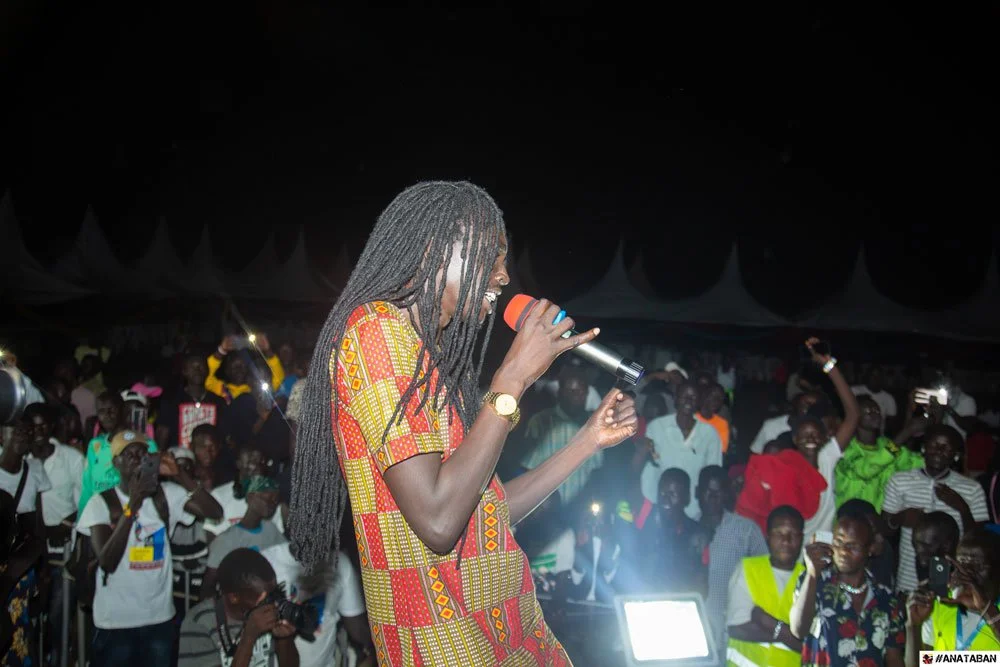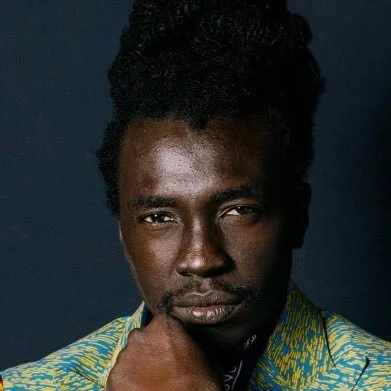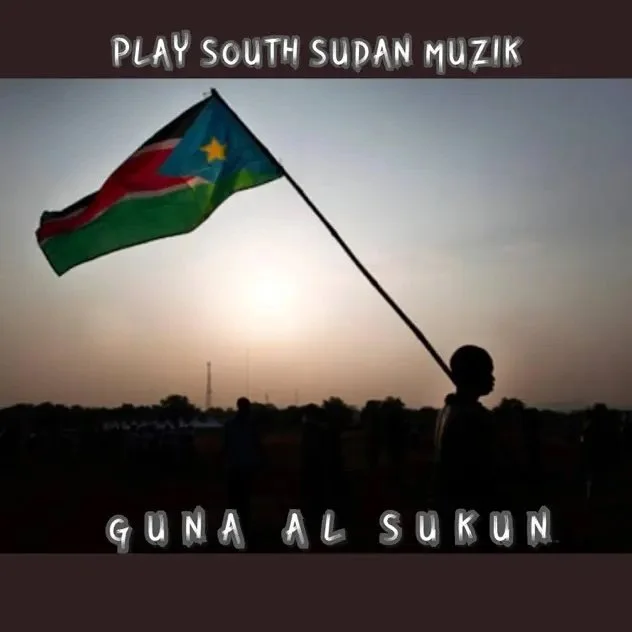Fighting with Song
In South Sudan, there is independence, but not yet justice.
Read
Manasseh Mathiang was twice exiled from his homeland. Once: as a child fleeing a bloody civil war. A second time: as an activist who returned to help build a new country but ran afoul of the authorities. His crime? Singing for freedom and justice in South Sudan, where the government promised democratic reforms and delivered oppression instead. Still, Mathiang and fellow artists of the Anataban movement continue their struggle for peace — through music, murals, comedy and, when need be, protest.
The 22-year civil war that tore apart Sudan and South Sudan claimed more than 2 million lives. After hostilities ended in 2005, the south began a process to vote for independence. And on July 9, 2011, South Sudan joined the world community as its newest nation. But hopes for a free, peaceful country soon faded, when political opponents took up arms against one another and atrocities began anew. Many activists like Mathiang have been threatened, jailed and driven into exile. And in the north, new violence erupted just days before we posted this episode. Now citizens in Sudan also find themselves in the crossfire of powerful generals and their loyal forces.
Mathiang, who grew up as a refugee in Kenya, hopes one day to return to South Sudan and help rebuild the country. Meanwhile, he continues making protest music and working to promote human rights from abroad. His new album, Hagiga, meaning “truth” in Juba Arabic, pushes the authorities in his country to address rampant corruption and abuses of power. Mathiang spoke on this episode with Amel Gorani, who joined us in her first appearance as a guest-host, and Steve Parks — a longtime friend of the show. Learn more about Steve’s collaboration with Mathiang in the Cavalier Daily.
Meet
Manasseh Mathiang is a human rights activist and musician who has been agitating for South Sudanese civil rights for almost two decades. He founded the #WaveSouthSudan campaign, participated in the #DefyHateNow movement and helped lead “South Sudan Is Watching You.” His most influential project, Anataban, mobilized South Sudanese to speak out against corruption and delays in the democratic process. Mathiang fled to Kenya in 2021 after continued threats and harassment. Today he lives in Nairobi with his family, where he runs a marketing consulting business. Follow him on Twitter @manassehfanan.
Amel Gorani is a specialist in social justice, conflict resolution and international development. Originally from Khartoum, the capital of Sudan, Gorani has worked across Africa and Europe. She currently serves as deputy director for strategy, equity and impact at the Charlottesville, Va.,–based Center for Nonprofit Excellence. And she is an affiliate of the Nau Lab in our parent organization, the Karsh Institute of Democracy.
Ahead of the South Sudanese referendum on independence, Mathiang teamed up with fellow exiles Emmanuel Jal and Lam Tungwar, former child soldiers, to write the song “Gua.” Gua means “good” in Nuer. It was Mathiang’s first foray into music as activism.
The song hit the charts in Kenya, and especially resonated among South Sudanese refugees. Mathiang and his friends filmed the video for “Gua” at Kakuma Refugee Camp. Learn more about the song and its significance in this short film.
The #WaveSouthSudan campaign had a theme song featuring Mathiang along with artists Mer Obur and Easy General. With that hashtag, they invited citizens to post selfies displaying the South Sudanese flag. For fans wary of getting too political, Mathiang says, it offered a simple, nonthreatening way to express their ideals.
Mathiang’s first album, Voice of My Heart, came out in 2009. One of its tracks is “MY Lord.” Watch him perform that tune at a cafe last year.
Hagiga, is available on Spotify. Mathiang has much more to say, on YouTube, about the story behind the album and the views it expresses. We featured three tracks off Hagiga on this episode: “Leadership Crisis”; “Peace Sign”; and “Fight,” which opens and closes our interview with Mathiang.
The New York Times included Mathiang — among other residents of Juba, the South Sudanese capital — in a 2017 photo essay called “What War Can’t Destroy.”
Gorani comments on women’s rights in Sudan and ongoing efforts to counteract systemic oppression, in the Christian Science monitor. It’s an issue she has been thinking about for a long time: see her 2011 piece titled “Sudanese women demand justice,” in OpenDemocracy.
She is a contributor in the 2014 volume A Horn of Africa in Northern Europe.
Learn
Kakuma Refugee Camp, run by the UN Refugee Agency, opened in 1992 as a haven for Sudanese refugees, many of them boys escaping conscription in the civil war. It also accommodated Ethiopians and Somalis fleeing from strife in their own countries. New, compelling South Sudanese music, art and expressive culture emerged within refugee communities like Kakuma.
Find out more about Jal’s current Gua Africa initiative, which provides education in Kenya for refugees displaced by war.
The work of protest art among South Sudanese activists has included fashion shows and beauty pageants, which operate as messaging platforms as much as anything else. Miss Malaika’s 2015 winner, 22-year-old Ajaa Kiir, called for an end to ongoing conflict in her country.
Anataban drew inspiration from activists around Africa, especially the nonviolent Grifna movement in Sudan, to the north, which stood up against longtime dictator Omar al-Bashir. Al-Bashir was forced out of office in 2019 amid mass protests, but the military has since seized power.
Sudan has again descended into crisis. Initial attempts at a ceasefire in the latest hostilities in Khartoum and around Sudan have floundered. This situation is developing rapidly. Follow the latest from Al Jazeera.
The U.S. Institute of Peace breaks down the complexities behind South Sudanese independence. Although the January 2011 referendum passed with almost 99 percent approval, debates over oil-revenue sharing and other thorny issues between Sudan and South Sudan continued. The Comprehensive Peace Agreement of 2005 shaped this process.
Watch the official video of “Anataban,” the collaborative song that defined the movement. We also played “Ana Gaid” by Crazy Fox and “Broken” by Single Dee, both of which resonated deeply among South Sudanese citizens in the post-independence era.
“Broken” tells the story of an exile who returned to the country filled with hope for the future, only to see those hopes dashed amid political infighting. Disagreements among the political leadership in South Sudan soon descended into further armed conflict and, essentially, a new civil war.
Last month, the United Nations called on opposing factions in South Sudan to put down their arms and move faster toward long-delayed elections, now scheduled for 2024 at the earliest.
It’s not the first time we’ve covered freedom movements in Africa, as our listeners will remember. In Season Four, Will and colleague Emily Burrill spoke with Evan Mawarire about his #ThisFlag movement in Zimbabwe.
Heard on the show
We had a lot of fun laying out the tunes on this episode. Listen to more music from the activist-artists we featured: Manasseh Mathiang, Crazy Fox, Emmanuel Jal, Single Dee and Lam Tungwar.











